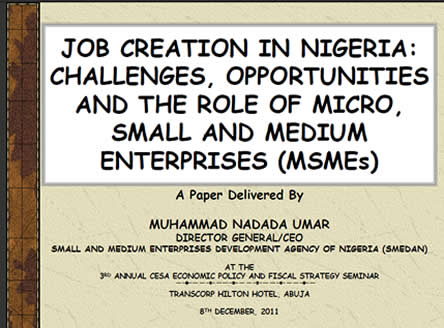Delivered By:MUHAMMAD NADADA UMAR
Document Size:25pages
The issues of MSME development and job creation are key in the present administration?s economic development efforts. This is one way of delivering the dividends of democracy and thereby stemming the tide of restiveness and insecurity in the nation. In realizing this, the Government has been trying to establish structures to ensure that the business environment is conducive for the private sector to thrive and create jobs. Entrepreneurs/MSMEs must be encouraged to drive the process of job creation as they are known, all over the world, as aggregate generators of employment.

